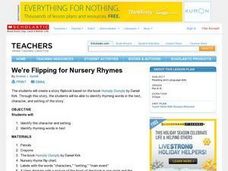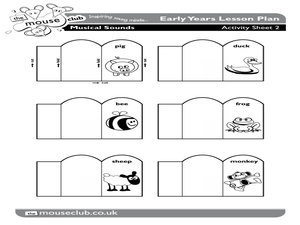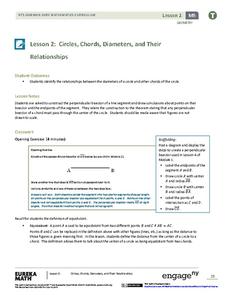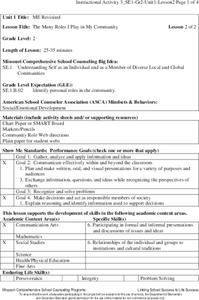Curated OER
Perfectly Puzzling Pentominoes
Second graders utilize manipulatives (pentominoes) to demonstrate knowledge of: lines of symmetry, slides, reflections (flips), rotations (turns), area, and perimeter. This lesson gives students a meaningful way to practice these...
Curated OER
Metrics And Measurements
Middle schoolers engage in a study of measuring distances between geographical locations on a map. They are able to define and use the map scale in conjunction with the metric system. For this lesson they make their own maps and measure...
Curated OER
We're Flipping for Nursery Rhymes
Students read a variety of nursery rhymes with a focus on "Humpty Dumpty". While reading, they identify the words that rhyme along with the setting, plot and characters. To end the lesson, they complete a Venn Diagram comparing "Humpty...
Curated OER
If You Give a Mouse a Cookie
Students identify the cause and effect in the book If You Give a Mouse a Cookie. In this cause and effect lesson, students listen to the story If You Give a Mouse a Cookie and discuss what the cause and effect is. As a follow-up,...
Curated OER
Musical Sounds
Students investigate music appreciation by completing worksheets. In this musical arts lesson, students complete worksheets in which they identify different musical instruments, the sounds they make and the family of instruments they...
Curated OER
Equilateral Triangle Symmetries Closure Activity
Students explore the symmetries of an equilateral triangle. In this lesson on symmetry, students determine the composition of given equilateral triangles using both rotational and reflectional symmetries.
Curated OER
Book Illustration
Students view a video and discuss what illustrations in a book show and don't show. For this observation lesson, students look at the details on a page in Alice in Wonderland and create an illustration.
Curated OER
Animal Names
Students match animal pictures with animal words. In this farm animal lesson, students put together the parent and their offspring. Students should have prior knowledge of the basic needs of animals. Students write animal booklets.
Curated OER
General Greene to General Marion: Your State is Invaded, Your All is at Stake
Third graders examine the contributions of Francis Marion and Nathaneal Greene. In this Revolutionary War lesson, 3rd graders use primary and secondary sources to research Marion and Greene and the accomplishments of their men during the...
Curated OER
Byzantium
Students examine the history of today's Istanbul. In this historical perspectives lesson plan, students research how Byzantium became Constantinople and later Istanbul as they examine the cultures of the city and create time lines that...
Curated OER
Sunken Slave Ship
Learners investigate shipwrecks. In this marine archaeology activity, students create the site of a shipwreck by using a tub filled with sand and items from a "ship". Learners excavate the site and analyze the findings.
Curated OER
Shape Hunt
Students explore two-dimensional and solid shapes. In this shapes and patterns geometry lesson, students work with a partner to create identifiable objects using tangrams. Students describe the attributes of their shape and their partner...
Curated OER
Making Models of Atoms and Isotopes
In this models of atoms and isotopes worksheet, students use marshmallow of different colors to represent the protons, neutrons and electrons in an atom. Students make models of the 3 isotopes of hydrogen. They draw a diagram of each and...
Nancy Fetzer's Literacy Connections
Expository Paragraph
Upper elementary and middle school writers learn how to craft an expository paragraph by following the six steps detailed in a 48-page instructional guide. Learners learn how to write six different types of informational paragraphs:...
EngageNY
Circles, Chords, Diameters, and Their Relationships
A diameter is the longest chord possible, but that's not the only relationship between chords and diameters! Young geometry pupils construct perpendicular bisectors of chords to develop a conjecture about the relationships between chords...
Poetry4kids
Evoking the Senses in a Poem
Budding poets choose a topic for a sensory-filled poem. Authors describe that topic using detailed language based on the five senses. Then, switch the senses to create a fanciful poem intended to add a touch of fun to the objective.
EngageNY
Solve for Unknown Angles—Angles in a Triangle
Assist your class with each angle of geometry as they use exterior angles to form linear pairs with adjacent interior angles. They cover multiple vocabulary terms and work practice problems, complete with justifications, before...
National Geographic
Mapping the Shape of Everest
With Mount Everest as the motivator, your earth science class learns about topographic maps. Begin by showing a film clip from The Wildest Dream: Conquest of Everest, featuring fearsome virtual imagery of a path up world's tallest...
EngageNY
Using Sample Data to Compare the Means of Two or More Populations
Determine whether there is a difference between two grades. Teams generate random samples of two grade levels of individuals. Groups use the mean absolute deviation to determine whether there is a meaningful difference between the...
Education Outside
Animal Homes in the Garden
First graders journey to the school garden to examine the habitats of garden animals. Using the provided graphic organizer, kids locate and sketch a critter and its habitat before returning it to its home.
Berklee College of Music
Create Your Own Afro-Latin Groove
The backbone of Latin American music is the beat! Young musicians work on blending Afro-Latin rhythms and beat patterns before incorporating the major pentatonic, minor pentatonic, and blues scales in their own compositions.
Healthy Native Youth
Chapter 7: Revisiting the Circle of Life
Scholars revisit the Circle of Life to examine positive character traits—mental, physical, spiritual, and emotional. Pupils discuss how those character traits could help them make responsible decisions and not contract HIV/AIDS. Learners...
Missouri Department of Elementary
The Many Roles I Play in My Community
Small groups brainstorm their roles in the community. Then, individually, complete a community roles web worksheet. Peers share their completed product and extend the conversation to include the feelings and character traits that go...
DK Publishing
Using the 5 Times Tables, Part 2
Practice the five times table with frogs! After a lesson on multiplying by five, have your third graders draw a line between a group of frogs and the product of the multiplication problem. The numbers go up to 50, which helps learners...























